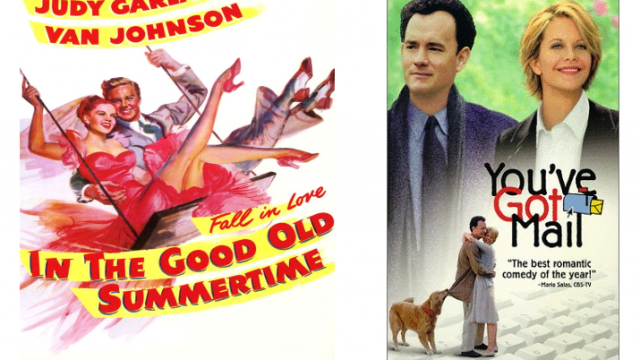In comparing In the Good Old Summertime and You’ve Got Mail, both adaptations of the play The Parfumerie (1937), I feel the personalities of the characters must be the first thing discussed. Many differences exist between the two leads in the films, although, I have to say fewer exist in the supporting roles. The environment that the eventual love match is fostered in is also quite different. Not just the cities, but the work they are involved in, and their more separated lives. Finally, the way the conclusion of the movie is brought about in both films is worth discussing. These are some of the points we will examine in our comparison of this tale told over and over.
In the Good Old Summertime the leads are played by Judy Garland (Veronica Fisher) and Van Johnson (Andrew Larkin). I will take this moment to say that I fear any movie with Judy Garland as the lead would have only a strong female. A female unafraid to stand up to the men in her life, regardless of the era [look at The Pirate (1948)], and unafraid to make her own way. This film is no different in that she lives with a spinster aunt and goes out looking for a job, and fearlessly communicates with a gentleman via a mistake in the post office boxes. In contrast, Meg Ryan’s character of Kathleen Kelly is demure. She is too polite to break up with a man she lives with and finds entirely unsuitable. Neither does she reveal to her boyfriend her secret correspondence with another gentleman. She does share it with her dear friend and coworker at the shop she owns, Shop Around the Corner (another name of a film version of this story made in 1940). When Fox Books (a superstore like Borders or Barnes and Noble) moves in one block over, she quaintly thinks that their knowledge and longstanding patrons will make up for the proximity of the big box store.
Van Johnson’s character is a confident salesman in a local music shop and upon knocking Miss Fisher down, completely ruining her whole outfit, he invites her to call upon him to pay any bills that might result. His characters personality is that of a man who knows music and his way around a sale, but is unable to see the way he emotionally effects those around him (for instance he mistakes Miss Fisher’s anger as a come on after the accident). Larkin has been unknowingly encouraging a young lady who plays violin, Louise Parkson (Marcia Van Dyke), into thinking their relationship greater than friendship. The maitre d’ even comments on it at our first meeting of Louise Parkson. Even with the evidence voiced to him, Larkin insists that theirs is merely a friendship. An idea further disabused when he speaks of his most recent letter from his “lady friend” to Miss Parkson and she displays obvious confusion and sadness at this revelation. Tom Hanks’ character (Joe Fox) is a business savvy CEO. He is quite polite and very aware of his charming nature. He, too, is living with someone else at the beginning of the film and does not share that he is corresponding with another woman. Upon his meeting first meeting with Kathleen Kelly (Ryan), he fails to admit that he is in fact Joe Fox, the very man causing her employees unease as he builds a new store near her own. This makes his behavior secretive, and a little repulsive to me.
The setting for In the Good Old Summertime is Chicago in a music shop that both individuals work at. The setting for You’ve Got Mail is New York and the two are competitors. In fact, Joe Fox put Kathleen out of business. It is never discussed if Kathleen gets another job or if she is just living off of savings. The setting is important to discuss, because when one works in close proximity with another day in and day out, it easy to establish a relationship. Even if that relationship is one of mutual dislike, as it is at first with Mr. Larkin and Miss Fisher. When Larkin discovers that it is Miss Fisher he has been corresponding with, he decides to “sabotage” her meeting. The next day she doesn’t come into work feeling “heart sick” (I would seriously fire anyone who had the gall to call in and give that for the reason), and Larkin visits her and shows her a kinder side she heretofore had only seen in his letters. At the end of the movie, Larkin decides to have one more “joke” at her expense saying he had met her mysterious pen pal and making up horrible things about him before revealing it is in fact, he who has been writing her. The few experiences Kathleen has with Joe are honestly hostile in nature. Besides the first meeting, where he lies by omitting his last name from her, they meet at a party (where he again fails to identify himself and is outed by another man in the book business), in a grocery store where he helps her, and then in a restaurant where each is supposed to be meeting the other’s pen pal. Joe is the only one who knows that he is in fact the person Kathleen is waiting for and he keeps it from her. The next time they meet is after Joe has run her out of business. She is ill and he visits her bringing her favorite flowers. This seems to start a weird friendship for the two and they talk about how this guy she is writing keeps not showing up to meetings he requests. They wonder about who he could be and turn it into a game that deepens their friendship.
Other versions of this story can be seen in Shop Around the Corner (1940), and She Loves Me, a musical play first performed in 1963.

